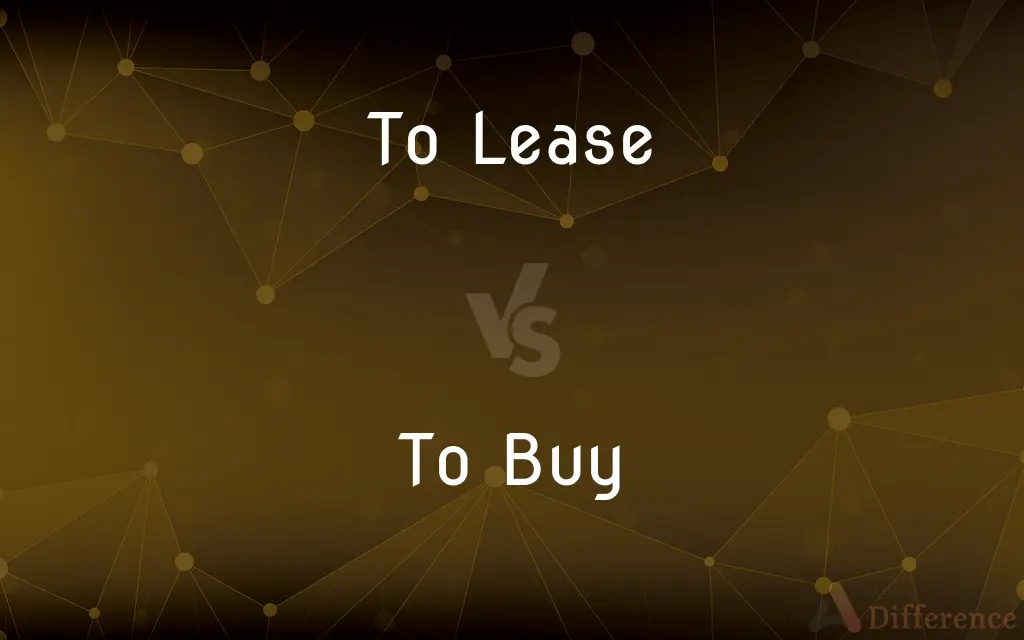To Lease vs. To Buy — What's the Difference?
By Tayyaba Rehman — Published on November 3, 2023
To Lease means temporarily obtaining the use of an asset for payment, while To Buy means acquiring ownership of an asset through payment.

Difference Between To Lease and To Buy
Table of Contents
ADVERTISEMENT
Key Differences
To Lease means entering into an agreement where one can use an asset, often property, equipment, or vehicles, for a specified period in exchange for periodic payments. On the contrary, To Buy means acquiring complete ownership of an asset, transferring all rights to the purchaser upon payment.
When one decides To Lease, they essentially rent the asset for a set period, after which they return it or renegotiate the terms. Choosing To Buy, however, provides the freedom and responsibility of full ownership, allowing the asset's use without time restrictions.
For businesses, To Lease equipment might be preferable if they anticipate technological advancements rendering current equipment obsolete quickly. Opting To Buy might suit those wanting long-term use without worrying about recurring lease payments.
Financially, choosing To Lease can mean lower upfront costs and the flexibility of changing assets without large investments. In contrast, choosing To Buy might require a more significant initial expenditure but offers the advantage of asset appreciation over time.
Lastly, the decision between To Lease and To Buy is also influenced by tax implications. Leasing may offer certain tax advantages in deducting lease payments, while buying may allow for depreciation benefits.
ADVERTISEMENT
Comparison Chart
Ownership
No permanent ownership; temporary rights
Full ownership acquired
Duration
Fixed term; can be short or long-term
Indefinite; lasts as long as asset exists
Upfront Costs
Generally lower
Typically higher
Flexibility
Easier to upgrade or change assets
Requires resale or repurchase
Financial Impact
Regular payments; potential tax deductions
Asset appreciation; potential depreciation benefits
Compare with Definitions
To Lease
A contract granting use of property for a set time.
The company chose To Lease the new office space for five years.
To Buy
Acquire ownership through payment.
She saved enough money To Buy her dream home.
To Lease
Acquire temporary use without ownership.
They opted To Lease the car rather than make a purchase.
To Buy
Make a purchase.
They went to the store To Buy groceries.
To Lease
Temporarily obtain rights to an asset for payment.
It might be economical To Lease the machinery rather than buy it.
To Buy
Obtain in exchange for compensation.
He plans To Buy a new suit for the upcoming interview.
To Lease
To rent out property or equipment.
The landowner decided To Lease the farmland to a local farmer.
To Buy
Invest in acquiring an asset.
With rising property values, now might be a good time To Buy.
To Lease
Engage in a rental agreement for an asset.
Due to budget constraints, they decided To Lease the software licenses.
To Buy
Permanently acquire rights to an asset.
Instead of renting, they decided To Buy the equipment for long-term use.
Common Curiosities
What does it mean To Lease?
To Lease means to temporarily obtain the use of an asset in exchange for periodic payments.
Can I opt To Lease and later decide To Buy?
Yes, some lease agreements include an option To Buy at the end of the lease term.
Is the decision To Buy always a long-term commitment?
Typically, buying is more long-term than leasing, but you can resell or liquidate an asset if needed.
What does To Buy entail?
To Buy means acquiring complete ownership of an asset by paying its price.
If I want to keep updating my assets, is it better To Lease or To Buy?
To Lease is often more flexible for those wanting to regularly update or change assets.
What happens if I break a lease agreement?
Breaking a lease agreement might result in penalties or legal actions, depending on the terms.
Is it cheaper To Lease or To Buy in the short term?
Generally, in the short term, it's often cheaper To Lease due to lower upfront costs.
If I Lease, do I have any ownership rights to the asset?
No, leasing grants temporary use rights, but ownership remains with the lessor.
If I want full control over an asset, should I Lease or Buy?
To Buy gives you full ownership and control over the asset.
Do I build equity when I Lease?
No, leasing doesn't build equity; you're essentially renting the asset.
Can I negotiate terms when I decide To Lease?
Yes, lease terms, such as duration and payments, are often negotiable.
How does asset depreciation affect the decision To Buy?
When you Buy, you might benefit from tax deductions due to asset depreciation, depending on tax laws.
Can I customize or modify an asset I decide To Buy?
Yes, when you Buy an asset, you generally have the freedom to modify it as you see fit.
Are there tax benefits associated with choosing To Lease?
Yes, leasing may offer tax advantages like deducting lease payments, but it's best to consult a tax expert.
Do I need insurance if I decide To Buy an asset?
Yes, it's often advisable to insure valuable assets you Buy to protect against potential loss.
Share Your Discovery

Previous Comparison
Risk vs. Risky
Next Comparison
Car Registration vs. Car InsuranceAuthor Spotlight
Written by
Tayyaba RehmanTayyaba Rehman is a distinguished writer, currently serving as a primary contributor to askdifference.com. As a researcher in semantics and etymology, Tayyaba's passion for the complexity of languages and their distinctions has found a perfect home on the platform. Tayyaba delves into the intricacies of language, distinguishing between commonly confused words and phrases, thereby providing clarity for readers worldwide.
















































